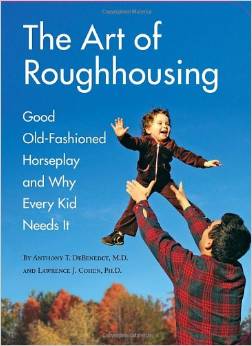
All mammals do it. Even ants do it. Roughhousing is essentially aggressive, interactive, high-trust play in which no one is actually getting hurt. The classic example is the the daddy lion with his cubs, taking them in his jaws, pinning them with his heavy paws. This kind of play is innate and prepares animals to stay in control if and when they need to be aggressive.
Most of us don’t tend to be big fans of children’s aggression in general and rough play in particular. It’s violent, loud, unpredictable and hard to reign in, all of which can seem to make our parenting job harder.
But roughhousing makes kids more confident, promotes self-control, builds emotional intelligence, strengthens social skills, and allows for emotional release in a playful, intimate way.
Because of all of these research-supported benefits, roughhousing is making a comeback; there’s even a book about it, The Art of Roughhousing by Anthony DeBenedet and Lawrence Cohen. It turns out that roughhousing makes the rest of your parenting job way easier, because there is a positive outlet for big feelings so they don’t get worked out in more problematic ways.
But, almost 100 percent of the roughhousing conversation involves fathers and sons. This might make sense because aggression is more prominent amongst males, and kids prefer to play with men. In fact, research has shown that as early as 3 months, babies prefer to play with men over women and engage with men more like peers in play. Mom play tends to be verbal, sedentary and gentle.
But just as fathers can be supreme midnight soothers, mothers can be awesome roughhousers. Not all children have fathers. Moreover, women and girls have aggressive feelings, too, and few know how to deal with them. It turns out that roughhousing can help "mean girls" access their feelings more directly, which cuts down on the meanness.
 Here are some signs that your child needs to roughhouse with you, Mom!
Here are some signs that your child needs to roughhouse with you, Mom!
- You kid is high-energy and always wants to roughhouse anyway
- Your kid has a lot of big emotions and you want to help coach your child to manage these feelings
- Your child tends to be sedentary and introverted and could benefit from gaining more confidence in using his or her physical and relational strength
- You are feeling disconnected from your child, like you don’t really get what’s going on in there and haven’t been very snuggly of late
Things to be prepared for:
By definition, this kind of play is about finding limits, so there will be times when someone is too rough. This is okay. Provide clear feedback: “Ouch, too rough. No hard kicking,” and keep going. Children almost always reign it in. This is precisely the self-control we want to teach.
Occasionally, roughhousing can lead to tears, sometimes under the pretext of “You hurt me.” This is also okay. The play may have activated feelings that needed to come out, and they are coming out in tears rather than laughter and body slams.
Sometimes, if a child is carrying around a lot of fear or pain, the roughhousing will not feel light or fun but rather too intense, mean and dark. In these situations, your child needs you to reflect back how tense he or she seems, like, “This doesn’t feel fun. You seem really mad.” This may ignite a bigger upset, but this too is a good thing. Your child has opened up something that needs to be expressed and needs your help working through it.
Expect your feelings to get stirred up, too. If and when they do, talk to your partner or another trusted person, treating those feelings with the respect they deserve.
Beginner roughhousing games
These games and many more can be found in The Art of Roughhousing. Whatever the game, prioritize the giggle; be ridiculous, silly, bumbling, over-the-top and don’t tickle (tickling creates involuntary laughing, not the trusting, emotional release kind).
Airplane: Good for any age. Lie on your back and put your child on your feet or shins.
Prisoner: Have your child 'lock' you in a make-shift prison and try to get out, allowing for some playful “Oh no! I’ll never get out!” dramatics.
Sitting Duck: Lie in the middle of the floor and say, “I am so tired, I just need a little nap. I sure hope nobody gets me!”
Sock Thief: Each person tries to take of the other person’s socks while trying to make sure their own stay on.
So, Mom — What can you commit to? What is one rowdy, high-contact, high-giggle game you can play? Take a change and expand your comfort zone. You, your child, and your relationship will be the better for it.











